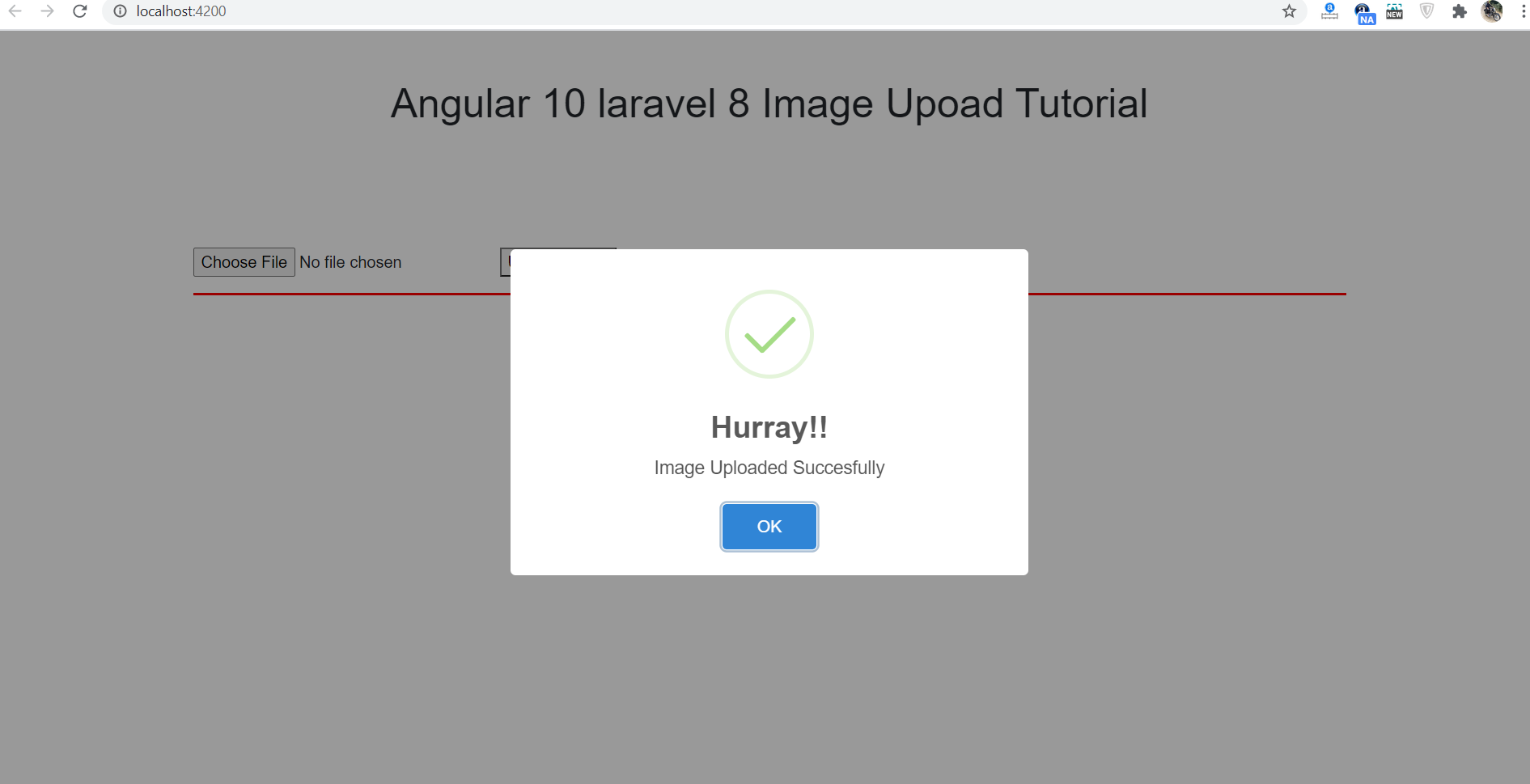Hello friends, welcome back to my blog. Today in this blog post, I am going to show, Angular 10 Laravel 8 Image Upload Tutorial.
Guys we can use same code snippet for Angular 12 Laravel 8 Image Upload. I checked it and it will work fine.
Angular12 came and if you are new then you must check below link:
Friends now I proceed onwards and here is the working code snippet for Angular 10 Laravel 8 Image Upload Tutorial and please use carefully this to avoid the mistakes:
1. Firstly friends we need fresh angular 10 setup and for this we need to run below commands but if you already have angular 10 setup then you can avoid below commands. Secondly we should also have latest node version installed on our system:
Guys you can skip this step this step if you already have angular 10 fresh setup:
npm install -g @angular/cli ng new angularimageupload //Create new Angular Project cd angularimageupload // Go inside the Angular Project Folder ng serve --open // Run and Open the Angular Project http://localhost:4200/ // Working Angular Project Url
2. Now friends, here we need to run below commands into our project terminal to install sweetalert2 modules into our angular application:
npm install --save sweetalert2 ng serve --o
3. Now friends, here we need to add below into our angular.json file to get modules styles and scripts:
...
"styles": [
...
"node_modules/sweetalert2/src/sweetalert2.scss",
],
"scripts": [
...
"node_modules/sweetalert2/dist/sweetalert2.js",
]
...
4. Now friends we need to add below code into your src/app/app.module.ts file:
import { FormsModule } from '@angular/forms';
import { HttpClientModule } from '@angular/common/http';
@NgModule({
imports: [
...
FormsModule,
HttpClientModule
],
5. Now friends we need to add below code into src/app/app.component.ts file:
import {NgForm} from '@angular/forms';
import { HttpClient,HttpHeaders } from '@angular/common/http';
import Swal from 'sweetalert2/dist/sweetalert2.js';
export class AppComponent {
...
constructor(private http:HttpClient) { }
/* file upload */
/* Variabe to store file data */
filedata:any;
/* File onchange event */
fileEvent(e){
this.filedata = e.target.files[0];
}
/* Upload button functioanlity */
onSubmitform(f: NgForm) {
var myFormData = new FormData();
const headers = new HttpHeaders();
headers.append('Content-Type', 'multipart/form-data');
headers.append('Accept', 'application/json');
myFormData.append('image', this.filedata);
/* Image Post Request */
this.http.post('http://localhost/laravel8/public/api/sample-restful-apis', myFormData, {
headers: headers
}).subscribe(data => {
//Check success message
//sweetalert message popup
Swal.fire({
title: 'Hurray!!',
text: data['message'],
icon: 'success'
});
});
}
/* file upload */
}
6. Now friends we need to add below code into src/app/app.component.html file:
<form #f="ngForm" (ngSubmit)="onSubmitform(f)">
<input type="file" name="myFile" (change)="fileEvent($event)"/>
<button>Upload Image</button>
</form>
7. Now friends, we need to add below code into our laravel 8 project routes/api.php file:
<?php
...
use App\Http\Controllers\HomeController;
...
/*
|--------------------------------------------------------------------------
| API Routes
|--------------------------------------------------------------------------
|
| Here is where you can register API routes for your application. These
| routes are loaded by the RouteServiceProvider within a group which
| is assigned the "api" middleware group. Enjoy building your API!
|
*/
...
Route::post('/sample-restful-apis', [App\Http\Controllers\HomeController::class, 'uploadimage'])->name('sample-restful-apis');
...
8. Now friends, we need to add below code into our laravel 8 project app/Http/Controllers/HomeController.php file:
<?php
...
class HomeController extends Controller
{
...
//File Upload Function
public function uploadimage(Request $request)
{
//check file
if ($request->hasFile('image'))
{
$file = $request->file('image');
$filename = $file->getClientOriginalName();
$extension = $file->getClientOriginalExtension();
$picture = date('His').'-'.$filename;
//move image to public/img folder
$file->move(public_path('img'), $picture);
return response()->json(["message" => "Image Uploaded Succesfully"]);
}
else
{
return response()->json(["message" => "Select image first."]);
}
}
}
Now we are done friends. If you have any kind of query or suggestion or any requirement then feel free to comment below.
Guys in this post, I am uploading image from my angular 10 front-end and save that image inside folder with Laravel 8.
Note: Friends, I just tell the basic setup and things, you can change the code according to your requirements. For better understanding must watch video above.
I will appreciate that if you will tell your views for this post. Nothing matters if your views will be good or bad.
Jassa
Thanks

Leave a Reply
You must be logged in to post a comment.